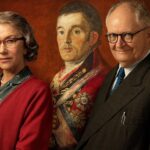With all the current talk of membership of the EU it is a good time to think about our membership of the Commonwealth. Commonwealth Day was on 14th March and while it has a certain official status, it is not a public holiday in most member countries, and there is little public awareness of this celebration.
Formerly known as the British Commonwealth, the Commonwealth of Nations is a loose association of former British colonies and current dependencies, along with some countries that have no historical ties to Britain.
It was founded in 1931 and has 53 member states. Her Majesty Queen Elizabeth II is at its head and 30% of the world’s population live in the member countries.
It was only after the independence of India and Pakistan in 1947 that the Commonwealth acquired its modern shape. It dropped the word British from its name, the allegiance to the crown from its statute, and became an association for decolonised nations. The British monarch, however, remained the official head of the Commonwealth.
The Commonwealth adopted its Charter in 2012, which commits members to 16 core values of democracy, gender equality, sustainable development and international peace and security. Heads of Government Meetings are held every two years to discuss issues of common interest.
In between the summits, the London-based Secretariat – the Commonwealth’s executive arm – takes responsibility for carrying out programmes agreed upon during the various meetings.
Head: Her Majesty Queen Elizabeth II
As head of the Commonwealth, the Queen is recognised by its members as the “symbol of their free association”.
The Queen attends its summits and the Commonwealth Games, which are held every four years. Her advanced age means that she is no longer likely to attend on a regular basis if travel involves long distances, and may delegate the duty to her heir, Prince Charles.
On every Commonwealth Day, the second Monday in March, the Queen broadcasts a message to all member countries.
Secretary-general: Kamalesh Sharma
The secretary-general acts as the chief executive and is elected by heads of government from among Commonwealth diplomats and foreign ministers for a maximum of two four-year terms.
The present secretary-general, Kamalesh Sharma, was elected in November 2007 and assumed office on 1 April 2008. An Indian diplomat, he had previously served as India’s High Commissioner to the United Kingdom.
Issues and challenges
The Commonwealth has been criticised for being a post-colonial club. But to its members it is a voluntary association of independent states in the business of promoting democracy, good government, human rights and economic development.
It has also been criticised for having little influence, as member countries do not act as a bloc in international affairs and have little influence over non-members.
However, its sway over its own members derives from the benefits which membership brings in developmental support and co-operation on international goals.
In 1995 the Commonwealth set up a Ministerial Action Group (CMAG), comprising eight ministers, whose function is to deal with governments that persistently violate its principles. Collectively they can take such punitive measures as imposing economic sanctions or suspending recalcitrant members.
The Commonwealth draws its main strength from its moral authority. Committed to racial equality and national sovereignty, it was the focus of the campaign against apartheid in the 1980s. In 1995 it suspended Nigeria’s membership after the military regime there passed the death sentence on the writer Ken Saro-Wiwa and other activists, and in 2000 it suspended Fiji after the overthrow of the elected government.
Zimbabwe was suspended in March 2002, after elections which observers said were marred by violence and intimidation. In December 2003 the suspension was extended indefinitely. The Zimbabwean government responded by announcing the country was leaving the organisation for good.
Pakistan was suspended twice during the military rule of President Pervez Musharraf.
In 2013 The Gambia announced its withdrawal from what it called a “neo-colonial institution”.
Membership of the Commonwealth brings some practical benefits through the Fund for Technical Cooperation (CFTC). This is the main way in which the organisation promotes economic and social development and the alleviation of poverty.
The Commonwealth Games is a unique, world class, multi-sport held every 4 years and are often referred to as the Friendly games. All member states are invited to send competitors to take part. The three core values of the games are Humanity, Equality and Destiny.
Queen’s Speech
This year the theme for the association is inclusivity and in her annual message the Queen has said that the people of the Commonwealth should “support those in need” and others who “feel excluded”.
The Duke of Edinburgh, Duke and Duchess of Cambridge and Prince Harry joined the Queen for the Commonwealth Day service at Westminster Abbey this year.





